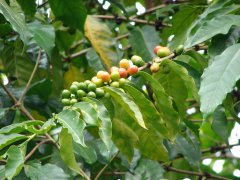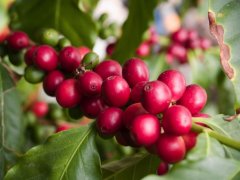Brazilian coffee bean production reduces global coffee prices rise what brands of Brazilian coffee beans are cheap

Professional coffee knowledge exchange more coffee bean information please follow the coffee workshop (Wechat official account cafe_style)
Everyone wants to sigh a cup of coffee in the morning, but there will be two more mosquitoes in the future! Brazil, the world's largest producer of coffee beans, suffered from drought and fungus at the beginning of the year, resulting in a sharp drop in coffee bean production and a sharp rise in prices, triggering a chain reaction of price increases. When some local wholesalers buy expensive coffee beans, the retail price of each cup of coffee has to be increased to make up for the rising costs.
The USDA estimates that the drought in Brazil will drag down global coffee production by 1%, while futures analysts are even more pessimistic. If the harvest of 60 kg of coffee beans is taken into account, the annual harvest will drop from 60 million bales to less than 50 million bales, and there is even a chance to fall below 39.5 million bales. The price of Arabica coffee futures in July has risen 55 per cent this year, according to ICE.
The rent of raw materials will be increased by 2 yuan from Starbucks in Hong Kong.
This time, the futures price of Brazilian coffee beans has soared, gradually emerging at the retail and supply level of coffee. As a matter of fact, when Starbucks in Hong Kong increased its charges on 11 June, the prices of most beverages and food were adjusted by 1 to 2 yuan. Starbucks in Hong Kong responded that the price adjustment depends on other factors, including raw materials and rents.
Coffee boom in Japan pushes up prices
Local small and medium-sized coffee suppliers also saw an increase in the price of coffee beans. Global Coffee (Hong Kong) Coffee Planner Harry Chan said that Brazilian coffee beans have increased the most, up 20% since the beginning of the year. The company will buy several more coffee beans, offsetting higher prices through blend, including beans from Latin America, Colombia and Jamaica. Harry Chan revealed that the price of coffee beans is not only a factor of climate, but also the trend of coffee. He said: "for example, Japan set off a craze for Jamaican Blue Mountain coffee, and about 90% of the Jamaican Blue Mountain coffee beans were shipped to Japan. Other coffee merchants can't buy it even if they want to, so they push up the price. " He estimated that some Japanese coffee merchants directly bought coffee farms in Jamaica, growing coffee beans, wholesale and retail "through-train" operation.
Au Yanwen, owner of the coffee shop, said that the price of coffee beans has risen this year. The company mainly buys Brazilian Cerrado and organic coffee beans, which rise by an average of US $2 per kilogram. However, the district said that it would not raise the price immediately. "We always have a burden on soy beans, which we can withstand," she said. "
Jiecheng: soybean prices also rise in Southeast Asia
Apart from Hong Kong, the coffee industry in Macao is also feeling the pressure of rising prices of coffee beans. Jiecheng, a coffee wholesaler who has been in business for more than 72 years, supplies coffee beans to Galaxy Macau and Venetian hotel restaurants. "Brazilian coffee beans have risen the most," said Mr. Huang, purchasing manager. Brazilian beans bought this year rose from US $2400 per tonne to US $5000 per tonne, which is twice as expensive. " Yellow refers to the price of coffee beans produced in Southeast Asian countries has risen. For example, the price of Mantenin in Indonesia has risen by nearly 30% since March and April this year. The company is also prepared to buy coffee beans for several seasons or the whole year to cope with price fluctuations at the beginning of the year. Huang continued: "the rise of Brazilian beans this time is better than last time. I remember that the last time the price of coffee beans soared was in 2011, when it rose by one and a half times, and Zhong fell first for a year."
Important Notice :
前街咖啡 FrontStreet Coffee has moved to new addredd:
FrontStreet Coffee Address: 315,Donghua East Road,GuangZhou
Tel:020 38364473
- Prev

How do small farmers in Guji, a small coffee producing area in Sidamo, deal with raw coffee beans?
Easily watered coffee name: Guji Amberra Guji Ambela country: Ethiopia Ethiopia producing area: Guji Grade: Grade 1 treatment method: tanning method Natural Process Variety: Ethiopian Native species Ethiopian Heirloom altitude: 1900-1980 m Flavor: Cherry, cranberry, citrus, Assam black tea, sugar
- Next

The representative of neutral coffee-Brazilian coffee beans characteristics of Brazilian coffee treatment of Brazilian coffee
Professional coffee knowledge exchange more coffee bean information please follow the coffee workshop (Wechat official account cafe_style) Brazilian coffee is the world's number one coffee producer, coffee beans full particles, mild aroma and bean nature, moderate sour taste, smooth taste, is the representative of neutral coffee, individual taste or mixed with other coffee beans are an excellent choice. From
Related
- Detailed explanation of Jadeite planting Land in Panamanian Jadeite Manor introduction to the grading system of Jadeite competitive bidding, Red bid, Green bid and Rose Summer
- Story of Coffee planting in Brenka region of Costa Rica Stonehenge Manor anaerobic heavy honey treatment of flavor mouth
- What's on the barrel of Blue Mountain Coffee beans?
- Can American coffee also pull flowers? How to use hot American style to pull out a good-looking pattern?
- Can you make a cold extract with coffee beans? What is the right proportion for cold-extracted coffee formula?
- Indonesian PWN Gold Mandrine Coffee Origin Features Flavor How to Chong? Mandolin coffee is American.
- A brief introduction to the flavor characteristics of Brazilian yellow bourbon coffee beans
- What is the effect of different water quality on the flavor of cold-extracted coffee? What kind of water is best for brewing coffee?
- Why do you think of Rose Summer whenever you mention Panamanian coffee?
- Introduction to the characteristics of authentic blue mountain coffee bean producing areas? What is the CIB Coffee Authority in Jamaica?

